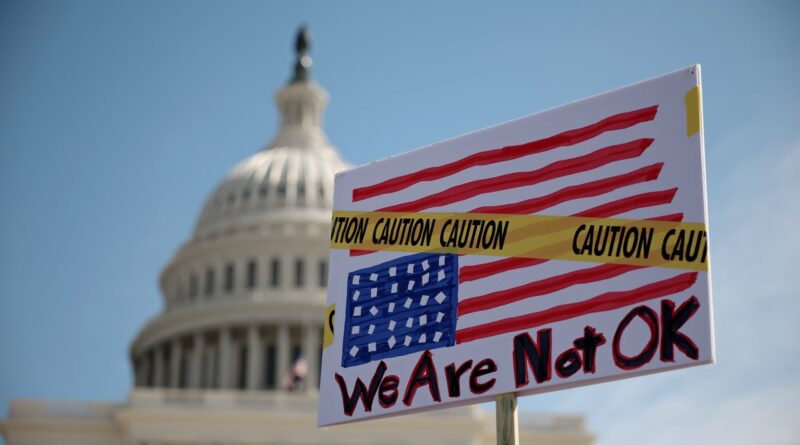Political Violence on the Rise: A New American Dilemma
This year has seen an increase in violent incidents affecting both Republican and Democrat members, with the killing of a conservative activist named Charlie Kirk drawing recent attention. A distinct aspect of modern American political dynamics is coming to the fore. Unlike most Americans and Democrats, a significant number of right-wing leaders regard violence exerted by their followers as a legitimate response. The tragic event involving Charlie Kirk led to measured and diplomatic reactions from all political spectrums. However, it also underscored the disparity in political ideologies that currently exist.
Several right-wing influencers and politicians, President Donald Trump included, have championed the cause for vengeance against the so-called ‘radical left,’ despite lacking any concrete information about the attacker or their motives. Within the past decade, Trump’s rhetoric has consistently suggested an acceptance, or even endorsement, of politically-driven violence perpetrated by his followers. The individuals that he granted clemency for their role in the insurrection of US Capitol on January 6, 2021, testify to this, with many of them being involved in violent crimes.
However, Trump and many people who align with his politics view these actions as legitimate defense, not as acts of violence. They portray their actions as a patriotic defense, fitting the narrative of the right-wing populists who see themselves as the victims in perpetuity. While there have been unfavorable comments made by those seeming to align with left-wing ideologies on social media, a majority of liberal commentators are unequivocal in their condemnation of violent acts and acknowledge Kirk’s contributions to the political discourse.
In contrast, many loud voices on the political right have chosen to display an aggressive and suppressive stance. Furthermore, Trump appears to be exploiting this event to disparage non-profit organizations that do not align with his perspectives. It wasn’t long ago that his administration had classified the entire Democratic Party as a ‘domestic terror organization.’ Considering his unrestricted use of federal power on individuals and organizations alike, the implication of bringing charges against opposition entities should raise red flags, not just within the Democratic Party but among all proponents of democracy.
In fact, Trump’s presidency has seen an evident lack of restraint when it comes to endorsing political violence, either directly or indirectly. Comparatively, democracies like Brazil have been successful in penalizing a president willing to plot a coup, as indicated by the trial and conviction of former President Jair Bolsonaro. Unfortunately, the aftermath of the January 6th incident did not effectively communicate the consequences of violent actions. Instead, America allowed Trump to regain power, thus sending a message that political violence in favor of Trump could be forgiven, even honored with military-grade burials.
Trump’s first term was marked by blatant disregard and cruelty towards many sectors. His administration, however, has been allocating significant resources for the creation of a violence cult. The Department of Homeland Security systematically exploits social media platforms for showcasing the torment of families whose members have been brutally taken from them. Trump’s modus operandi hinges upon the use of strategic displays, aimed at persuading people that he is accomplishing significant tasks.
Currently, instead of utilizing symbolic displays, his administration has resorted to actual images of suffering for upholding a presidency that is losing its popularity. While argument might be that such showcases are essential deterrents, it is possible that they may just serve to further unleash Trump’s supporters. His second term has been one of unrestricted actions where he hasn’t considered keeping up appearances of legality or even basic democratic norms of treating political rivals.
His justification for such undemocratic practices is the belief that the opposition has used the Justice Department against him, hence his actions are a form of deserved retribution. From his perspective, Trump is not the instigator but the victim, a narrative supported by a whole complex of grievance creators. His propagandists continually stimulate resentment in their audiences, manipulating a sense of victimhood as legitimacy for violent reactions.
This, however, does not suggest that the US is sliding towards a civil war. While there may be a faction ready and willing for conflict, studies indicate the vast majority of the populace stands against political violence. This sentiment was evident when support for such violent activities decreased after an attempt was made on Trump’s life, as pointed out by political scientist Brendan Nyhan.
Although there persists a hope that Trump will adopt a more presidential demeanor and work towards unity, his actions following Kirk’s murder suggest otherwise. Polarization has consistently been a part of his political strategy. With an administration fostering a ‘taste for cruelty’ rather than a ‘taste for disagreement’, many Americans may draw inspiration from his actions.
It’s concerning that in a society embarking upon progressive ideals of mutual respect and shared responsibility, such divisive rhetoric is flourishing. The perpetuation of a victimhood narrative and the blatant misuse of authority for personal and political gain are alarming trends that merit reflection. Democracy thrives on informed and balanced discussions, driven by the principles of justice, equality and mutual respect – and it is these principles that must guide the narrative moving forward.

